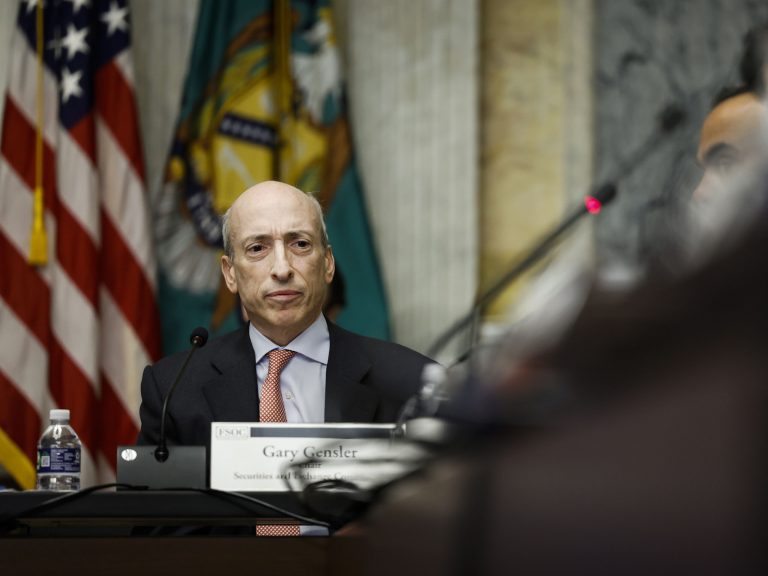
SEC Chairman Gary Gensler has confirmed that the agency is conducting an ongoing review of several applications for Bitcoin exchange-traded funds (ETFs) and discussed some of the potential benefits of such products. In a blog post published on Thursday, Gensler said that Bitcoin ETFs could provide investors with more transparency, liquidity, and efficiency in the crypto market, as well as reduce the risks of fraud and manipulation.
Gensler explained that the SEC’s review process involves evaluating whether the proposed ETFs meet the standards set by the federal securities laws, such as ensuring fair and orderly markets, protecting investors and the public interest, and preventing fraudulent and manipulative acts and practices. He added that the SEC staff is working diligently and expeditiously to review the applications and provide feedback to the applicants.
Gensler also highlighted some of the potential benefits of Bitcoin ETFs, such as:
Tekedia Mini-MBA edition 14 (June 3 – Sept 2, 2024) begins registrations; get massive discounts with early registration here.
Tekedia AI in Business Masterclass opens registrations here.
Join Tekedia Capital Syndicate and invest in Africa’s finest startups here.
– Providing investors with access to a regulated and transparent market for Bitcoin exposure, rather than having to deal with unregulated or offshore platforms that may have lower standards of investor protection and market integrity.
– Enhancing the liquidity and efficiency of the Bitcoin market, as ETFs could attract more institutional and retail investors, as well as facilitate price discovery and arbitrage opportunities.
– Reducing the operational and custody risks associated with holding Bitcoin directly, such as hacking, theft, loss of private keys, or technical glitches. ETFs would allow investors to hold Bitcoin indirectly through a regulated intermediary that would be responsible for safeguarding the underlying assets and ensuring compliance with applicable rules and regulations.
Gensler concluded his blog post by stating that he is optimistic about the potential of Bitcoin ETFs to foster innovation and competition in the crypto space, while also serving the needs and interests of investors. He said that he looks forward to working with his fellow commissioners and the SEC staff to advance the agency’s mission of protecting investors, maintaining fair and efficient markets, and facilitating capital formation.
Two of the most prominent entrepreneurs and investors in the US, Elon Musk and Mark Cuban, have teamed up to challenge the authority and legitimacy of the Securities and Exchange Commission (SEC), the federal agency that regulates the securities markets. In a joint amicus brief filed at the Supreme Court on Monday, Musk and Cuban argued that the SEC’s administrative proceedings, which are used to enforce securities laws and impose sanctions on violators, are unconstitutional and unfair.
The brief was submitted in support of a petition by Michelle Cochran, a former chief financial officer of a Texas-based company, who was accused by the SEC of fraud and fined $300,000 in an administrative proceeding. Cochran appealed the SEC’s decision, claiming that the administrative law judges (ALJs) who preside over such proceedings are not appointed by the President or confirmed by the Senate, as required by the Constitution’s Appointments Clause. She also claimed that the ALJs are insulated from removal by the President, which violates the Constitution’s separation of powers principle.
Musk and Cuban, who have both faced SEC investigations and lawsuits in the past, echoed Cochran’s arguments and added their own criticisms of the SEC’s administrative proceedings. They claimed that the SEC has an unfair advantage over defendants in such proceedings, because it can choose the venue, the rules of evidence, and the standard of review.
They also claimed that the SEC’s ALJs are biased in favor of the agency, because they are influenced by its performance metrics and incentives. They cited statistics showing that the SEC wins more than 90% of its administrative cases, compared to less than 70% of its cases in federal court.
Musk and Cuban urged the Supreme Court to grant Cochran’s petition and review the constitutionality of the SEC’s administrative proceedings. They said that such a review is necessary to protect the rights and interests of millions of Americans who participate in the securities markets, either as investors, issuers, or professionals. They also said that such a review would promote innovation and entrepreneurship, which are vital for the economic growth and competitiveness of the US.
The Supreme Court has not yet decided whether to take up Cochran’s case. If it does, it could have significant implications for the SEC’s enforcement powers and practices, as well as for the securities industry as a whole.



